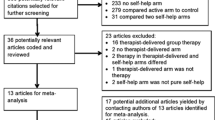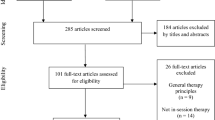Abstract
This study examined good therapists' views of how they are helpful to clients. The study's sample consisted of eight therapists who were identified by knowledgeable colleagues as particularly effective therapists. Indepth individual interviews were conducted with each of these therapists. Interview transcripts were analyzed qualitatively. Therapists' reflections on how they were helpful focused on interpersonal/relational versus theoretical/technical abilities. Their descriptions emphasized the artistic and humanistic aspects of therapeutic process. Implications for practice and further research are discussed.
Similar content being viewed by others
References
Beutler, L.E. (1991). Have all won and must all have prizes? Revisiting Luborsky et al.'s verdict.Journal of Consulting and Clinical Psychology, 59, 226–232.
Beutler, L.E., Machado, P.P., & Neufeldt, S.A. (1994). Therapist variables. In A.E. Bergin & S.L. Garfield (Eds.),Handbook of psychotherapy and behavior change (4th ed., pp. 229–269). New York: Wiley.
Coady, N. (1991). The association between complex types of therapist interventions and outcomes in psychodynamic psychotherapy.Research on Social Work Practice, 1, 257–277.
Coady, N. (1993). The worker-client relationship revisited.Families in Society, 74, 291–298.
Coady, N. (1995). A reflective/inductive model of practice: Emphasizing theory building for unique cases versus applying theory to practice. In G. Rogers (Ed.),Social work field education: Views and visions (pp. 139–151). Dubuque, IA: Kendall/Hunt.
Garfield, S.L. (1994). Research on client variables in psychotherapy. In A.E. Bergin & S.L. Garfield (Eds.),Handbook of psychotherapy and behavior change (4th ed., pp. 190–228). New York: Wiley.
Garfield, S.L., & Bergin, A.E. (1994). Introduction and historical overview. In A.E. Bergin & S.L. Garfield (Eds.),Handbook of psychotherapy and behavior change (4th ed., pp. 3–18). New York: Wiley.
Gitterman, A. (1988). Teaching students to connect theory and practice.Social Work with Groups, 11, 33–41.
Goldstein, H. (1990). The knowledge base of social work practice: Theory, wisdom, analogue, or art?Families in Society, 71, 32–43.
Hartman, A. (1990b). Education for direct practice.Families in Society, 71, 44–50.
Henry, W.P., Schacht, T.E., & Strupp, H.H. (1986). Structural analysis of social behavior: Application to a study of interpersonal process in differential psychotherapeutic outcome.Journal of Consulting and Clinical Psychology, 54, 27–31.
Hill, C.E., Mahalik, J.R., & Thompson, B.J. (1989). Therapist self-disclosure.Psychotherapy, 26, 290–295.
Horvath, A.O., & Symonds, B.D. (1991). Relation between working alliance and outcome in psychotherapy: A meta-analysis.Journal of Counseling Psychology, 38, 139–149.
Lambert, M.J., & Bergin, A.E. (1994). The effectiveness of psychotherapy. In A.E. Bergin & S.L. Garfield (Eds.),Handbook of psychotherapy and behavior change (4th ed., pp. 143–189), New York: Wiley.
Luborsky, L., McLellan, A.T., Woody, G.E., O'Brien, C.P., & Auerbach, A. (1985). Therapist success and its determinants.Archives of General Psychiatry, 42, 602–611.
Mahoney, M.J. (1986). The tyranny of technique.Counseling and Values, 30, 169–174.
Maluccio, A. (1979).Learning from clients. New York: Free Press.
Orlinsky, D.E., Grawe, K., & Parks, B.K. (1994). Process and outcome in psychotherapy-Noch Einmal. In A.E. Bergin & S.L. Garfield (Eds.),Handbook of psychotherapy and behavior change (4th ed., pp. 270–378). New York: Wiley.
Papell, C.P., & Skolnik, L. (1992). The reflective practitioner: A contemporary paradigm's relevance for social work education.Journal of Social Work Education, 28, 18–26.
Patterson, C.H. (1984). Empathy, warmth, and genuineness in psychotherapy: A review of reviews.Psychotherapy, 21, 431–438.
Patton, M.Q. (1990).Qualitative evaluation and research methods (2nd ed.). Newbury Park, CA: Sage.
Perlman, H.H. (1979).Relationship: The heart of helping people. Chicago: University of Chicago Press.
Rennie, D.L., Phillips, J.R., & Quartaro, G.K. (1988). Grounded theory: A promising approach to conceptualization in psychology?Canadian Psychology, 29, 139–150.
Rogers, C.R. (1957). The necessary and sufficient conditions of therapeutic personality change.Journal of Consulting Psychology, 21, 95–103.
Safran, J.S., McMain, S., Crocker, P., & Murray, P. (1990). Therapeutic alliance rupture as a therapy event for empirical investigation.Psychotherapy, 27, 154–165.
Schon, D.A. (1983).The reflective practitioner: How professionals think in action. New York: Basic Books.
Scott, D. (1990). Practice wisdom: The neglected source of practice research.Social Work, 35, 564–568.
Shulman, L. (1978). A study of practice skills.Social Work, 23, 274–288.
Shulman, L., & Gitterman, A. (1988).Integrating the personal with the professional self (Videotape). Montreal, QB: McGill University, Instructional Communications Centre.
Taylor, S.J., & Bogdan, R. (1984).Introduction to qualitative research methods: The search for meanings (2nd ed.). New York: Wiley.
Wolgien, C.S. (1992). Life experiences of good therapists. Unpublished MSW thesis. University of Calgary, Faculty of Social Work, Calgary, AB.
Author information
Authors and Affiliations
Rights and permissions
About this article
Cite this article
Coady, N.F., Wolgien, C.S. Good therapists' views of how they are helpful. Clin Soc Work J 24, 311–322 (1996). https://doi.org/10.1007/BF02190558
Issue Date:
DOI: https://doi.org/10.1007/BF02190558




